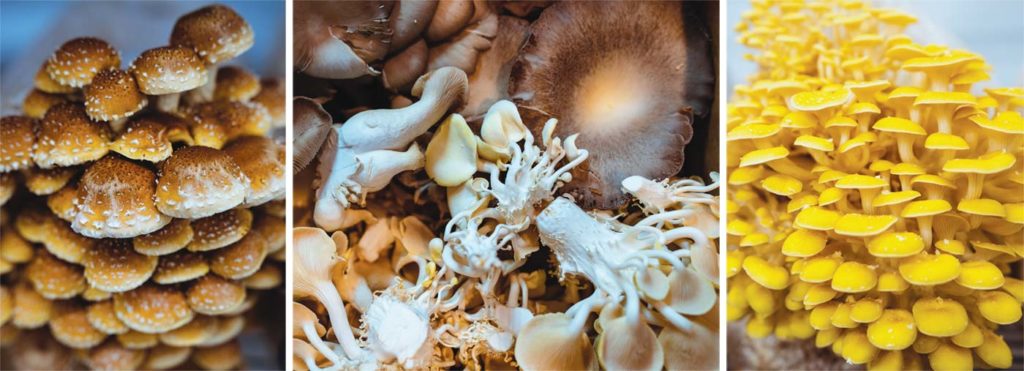Benjamin Deuling has found what makes him come alive: mushrooms—gourmet mushrooms of startling yellows, pearl greys, ocean blues, and autumn oranges. Under Deuling’s care and attention, his commercial gourmet mushroom farm known as SporeAttic has thrived in its first year of operation with weekly mushroom yields growing beyond Deuling’s expectations. They sell out weekly at the Bozeman Winter Farmers’ Market, where customers can also purchase mushroom growing kits so that they can grow their own mushrooms at home, and SporeAttic is currently supplying twelve restaurants and one grocery store.
Deuling is effervescent with energy for his business and one would never guess mushrooms weren’t always his passion. In 2017, he moved to Bozeman from Michigan to study microbiology as a PhD student at MSU but he was unsure of the direction his degree would take him. In a serendipitous meeting, a student in one of his classes shared about his experience as a mushroom farmer and Deuling was intrigued. In June 2019, the two went into partnership and founded SporeAttic.
Just a few months later, Deuling’s business partner had to move away from Bozeman, so with little in the way of funds Deuling began applying for grants and fellowships to help with startup costs. His vision attracted several grants and fellowships and he worked odd jobs to make up funding gaps.
As a result of Deuling’s vision and hard work, he never had to take out a loan or rely on an outside investor.
Nestled among the rolling hills just west of Bozeman, SporeAttic leases land from Three Hearts Farm for a facility built to Deuling’s specifications. The space is small but precise; every square foot is used for a specific purpose in the mushroom cultivating process.
The first step is sterilizing bags of substrate made up of soy hulls and sawdust. Deuling sterilizes them in atmospheric steam sterilizers for twenty-four hours and once they are void of any unwanted microorganisms, they are transferred to the lab: a sterile space where each of the mushroom strains has been grown and stored.
Deuling inoculates the substrate bags with sterilized wheat and barley bags that carry a particular mushroom culture, then they are moved to colonize for several weeks in an incubation room—a space reminiscent of a Parmesan cheese–aging cave with floor-to-ceiling shelves that house the inoculated bags. A healthy colonization has mycelium growth that looks like white lint covering the surface of the substrate packs.
After a few weeks, the bags are ready for the last phase of the growing process and are moved to the fruiting chamber, where levels of light, moisture, oxygen, carbon dioxide, and temperature conditions are tightly controlled. Within a week, mushrooms will begin to grow from slits cut into the sides of the bags and they are ready for harvest within another week. Harvest occurs daily. With two people tackling the job, 50–80 pounds of mushrooms can be collected in three to four hours.

“The longest we hold onto mushrooms and still sell them fresh is four days,” Deuling says. He processes excess mushrooms and trimmings at an off site commercial kitchen, turning them into mushroom chips, seasoning salt, and mushroom broth.
Customers and local chefs are loving the quality of SporeAttic’s mushrooms; they are picture perfect, have great flavor, and are harvested daily for ultimate freshness for the consumer. Deuling harvests over 400 pounds a week and he delivers to restaurants within two days of harvest.
Chef Alex Harbovsky of Open Range has been sourcing mushrooms from SporeAttic for the last year. “Each variety of mushroom has a distinct flavor,” he says. “From my time spent living and working in Marin County [in California’s San Francisco Bay area], I can say that these mushrooms are on par, if not better than what I found out there.”
Because each mushroom variety has its own unique flavor and color, they can be used in many ways. The large stem on the King Trumpet can be cut into small medallions and cooked like scallops (it even has the same texture). Lion’s Mane is considered the “seafood” mushroom, and with its shaggy fibers it can be pulled apart to resemble pieces of crab for a vegetarian crab cake. Deuling’s favorite meal is cutting the King Trumpet into strips, blanching them, adding the pieces to a ramen broth, and enjoying like noodles.
The possibilities seem endless for SporeAttic. Deuling’s vision is to scale regionally to individual towns in Montana and keep local accessibility at a premium rather than just growing larger in Bozeman. For now, he wants to “keep knocking it out of the park with quality and consistency” for his consumers.
- Photography by Nathaniel Bailey. Nathaniel Bailey is a commercial and editorial photographer based in southwestern Montana who brings a documentary style to his storytelling.

